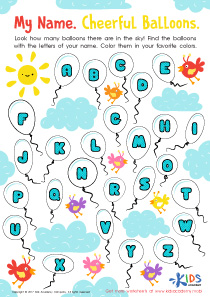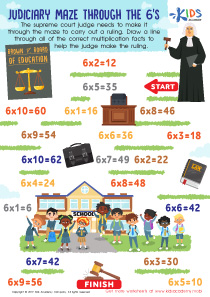Logic and Early Math Lessons | Data, Kindergarten
0 results
Introducing our new Data Lessons for children in Kindergarten! These interactive worksheets and educational videos provide a fun and engaging approach to learning important analytical skills. Through a series of activities, students will learn the basics of collecting, organizing, and interpreting data. In addition to the lessons, students will be able to test their knowledge through our assessment quizzes. Whether in the classroom or at home, our Data Lessons provide an excellent opportunity for young minds to develop their analytical skills in a fun and engaging way. Make sure your child is prepared for the future by enrolling in our Data Lessons today!
As we live in an increasingly data-driven world, teaching children about data has become more important than ever before. Children who are exposed to data lessons early on in their schooling have been observed to have a better understanding of the concept and its role in society.
The data lessons for children in Kindergarten have a range of interactive worksheets along with educational videos and assessment quizzes. These lessons designed for young children, introduce them with basic data concepts in a way that’s easy and fun to understand.
One of the most significant advantages of data lessons is that they help build children’s logical reasoning skills. Educational research shows, that children who are exposed to data concepts tend to have stronger critical thinking skills and perform better on complex problem-solving tasks.
Starting with simple bar charts and pie charts, children learn how to represent data visually using different graphical representation methods. In today's world data is everywhere, so children should learn how to read, analyse, and interpret this kind of information to make better decisions. From analysing sports scores, packing lunch for tomorrow, or deciding which toy to buy next, all these decisions require evaluation and analysis of data.
The interactive format of worksheets and quizzes makes it engaging for children while building their knowledge of basic data terminology like values, labels, and scales. Overall, it enhances their data literacy level by helping children to understand how to draw insights, ask questions, and find patterns in the data.
Another key benefit of the data lessons is that they teach children to think about data and evidence in a critical and systematic way. They learn how to collect data and analyse it in an unbiased way, which is particularly important in today's world of misinformation. Using scientific and fact-based approaches, children build their digital literacy skills with real-life data-driven examples.
Along with that, Data lessons help young children develop important life-skills which can also be applied in other areas of their life. Children who learn how to think critically and logically about data can apply these skills to everyday situations. Whether making decisions on where to play for the day or what craft project to work on next, children can use data analysis, and decision-making skill.
In the end, data lessons are much more than just about doing math. By exposing children to data analysis and data-driven solutions, students better understand how to interrogate the data, draw insights, and use that data to make better decisions. With developed digital and analytical skills, it can give children an advantage that lasts throughout their lifetime.















